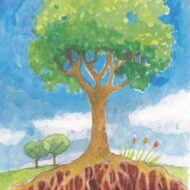as an elementary school counselor, i get to engage with children in many enriching conversations. discussing life skills has always been a topic that i find incredibly valuable to dialogue with children. this month’s guidance lesson with grades 2-4 was on changes that happen in our lives.
things in our life are constantly changing. some changes we can control and some changes we can’t control. can you think of some things that happen in your life that you can or cannot control?
the class, sitting in a circle, passes around a container of dried lima beans, a can, and a bug cage. each child takes out a lima bean and, if they feel comfortable, shares with the group either one thing that they can control (putting a bean in the can) or one thing that they cannot control (putting a bean in the cage).
CAN
my behavior
my thoughts
my life
how much sleep i get
what i wear
my little brother
my dogCAN’T
my mom and dad fighting
my grandfather dying
my parents getting a divorce
someone being mean to me
having to move
my little sister annoying me
my dog jumping on me
the weather
what has been most noteworthy to me in these revealing discussions is how much happens in children’s lives that they have absolutely no control over. in most classrooms the can would have 3-5 beans and the cage would be full. as an adult, can you imagine swimming through your days from one place to another, having to strictly follow and succumb to events in your life in which you have no control? can you imagine that feeling of complete helplessness, the extreme lack of control of the course of your day, your life?
then i start to think about adults… and the events, emotions, places of being in which we feel like we have no control. i was listening to someone explain the tendency of a child to just giggle uncontrollably when they are uncomfortable, anxious, or nervous. the child would giggle, giggle, giggle, until no breath was left… take a deep breath…. and then return to giggling, giggling, giggling. listening to this description made me think of addictions. how we constantly return to our addictions (our old habits) because they sooth us. they are often all we know as a means of coping with that which we are experiencing inside. and as is the nature of addictions, we fall into the habit of replaying the looping scenario of needing something and indulging in the addiction that provides that which we feel like we need (comfort, familiarity, calmness, numbness, security, support, companionship, etc.). this process becomes a fixation and often it takes such a strong hold on us that it seems as though we have no control over it. it is simply happening to us…. and we put a bean in the cage, feeling trapped and helpless.
in the guidance class, the next round of discussion is coming up with ideas of ways to respond to situations we can’t control. if many children mention that their parents argue a lot, the group shares suggestions of things you can do when you’re parents are fighting
go into your room and draw a picture that makes you feel good, go to a friend’s house, ask them to stop, go to your safe-secret space and relax there, make up a skit with your sister of what they look like when they’re fighting “they really look just like kids!”
this part is my favorite as i am always in awe of the children’s insight and their ability to help one another. we then pass the can around without the cage and re-emphasize things we have control of in our lives.
feel free to drop a bean in the can or cage if you’re so inspired.
